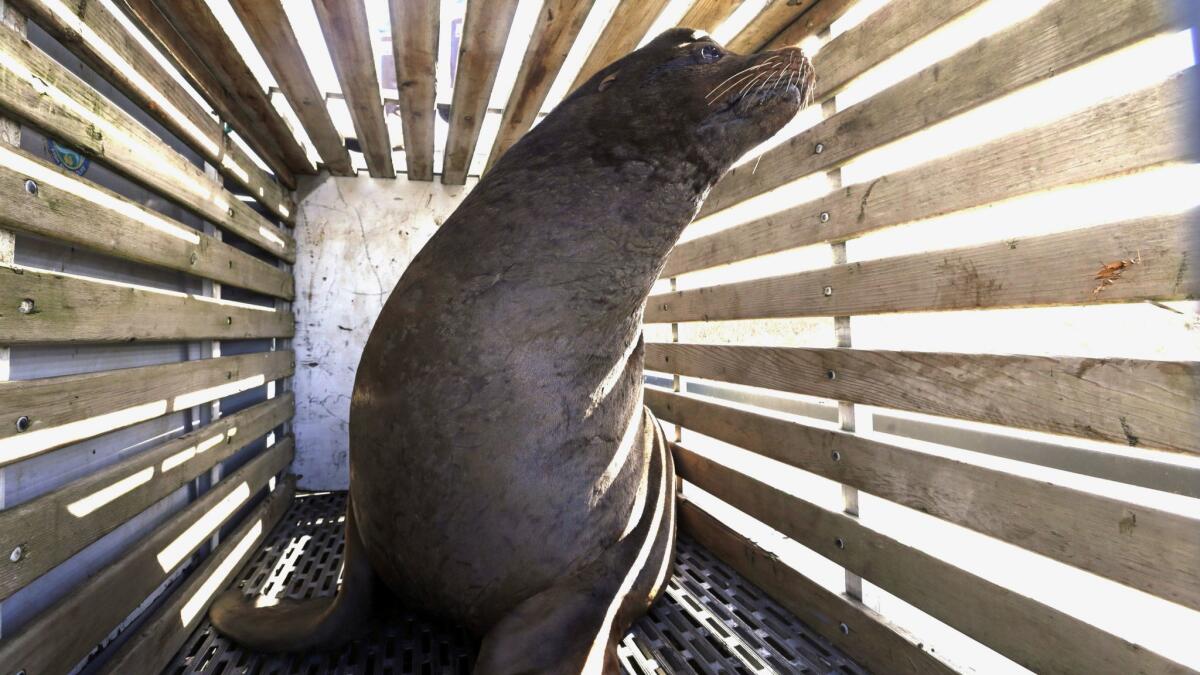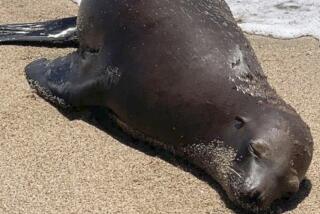Oregon begins killing sea lions after relocation fails

- Share via
Reporting from Portland, Ore. — Oregon wildlife officials have started killing sea lions that threaten a fragile and distinct type of trout in the Willamette River, a body of water that’s miles inland from the coastal areas where the massive carnivorous aquatic mammals usually congregate to feed.
The state Department of Fish and Wildlife obtained a federal permit in November to kill up to 93 sea lions annually below Willamette Falls south of Portland, Ore., to protect the winter run of the fish that begin life as rainbow trout but become steelhead when they travel to the ocean.
As of last week, wildlife managers have killed three of the animals using traps they used last year to relocate the sea lions, said Bryan Wright, project manager for the Oregon Department of Fish and Wildlife’s marine resources program.
The adult male sea lions, which weigh nearly 1,000 pounds each, have learned that they can loiter under the falls and snack on the vulnerable steelhead as the fish power their way upriver to the streams where they hatched.
The trout travel to sea from inland rivers, grow to adulthood as steelhead in the Pacific Ocean and then return to their natal river to spawn. They can grow to 55 pounds and live up to 11 years.
The sea lions breed each summer off Southern California and northern Mexico, then the males cruise up the Pacific Coast to forage. The mammals were once hunted for their thick fur and their numbers had dropped dramatically, but they have rebounded from 30,000 in the late 1960s to about 300,000 today because of the 1972 Marine Mammal Protection Act.
With their numbers growing, the dog-faced sea lions are venturing ever farther inland up the Columbia River and its tributaries in Oregon and Washington — and their appetite is having disastrous consequences, scientists say.
Last winter, a record-low 512 wild winter steelhead completed the journey past the Willamette Falls, according to state counts. Less than 30 years ago, that number was more than 15,000.
The sea lions are eating so many winter steelhead at Willamette Falls that certain runs of the fish are at a high risk of going extinct, according to a 2017 study by wildlife biologists.
Wildlife officials moved about a dozen sea lions to the coast near the small city of Newport last year, but the animals ended up swimming back to the falls within days.
So the state petitioned federal officials for permission to start killing the animals, which are listed as a federally endangered species.
The permit from the National Marine Fisheries Service says the targeted sea lions must have been observed eating at least one steelhead near Willamette Falls between Nov. 1 and Aug. 15 or have been observed in the same stretch of river on two consecutive days in that period.
Individual sea lions are identified by trained observers who look at brands on their back or tags on their flippers.
The animals are being killed by a veterinarian by lethal injection in the same way that dogs and cats are euthanized, Wright said. Their flesh goes to a rendering plant.
Before a sea lion is killed, the state must find out if there is a zoo or aquarium that wants the animal. If so, Oregon wildlife managers must hold the sea lion for 48 hours before killing it.
In a similar program, Oregon and Washington have already killed more than 150 sea lions below the Bonneville Dam on the Columbia River to protect threatened and endangered salmon.
More to Read
Sign up for Essential California
The most important California stories and recommendations in your inbox every morning.
You may occasionally receive promotional content from the Los Angeles Times.










